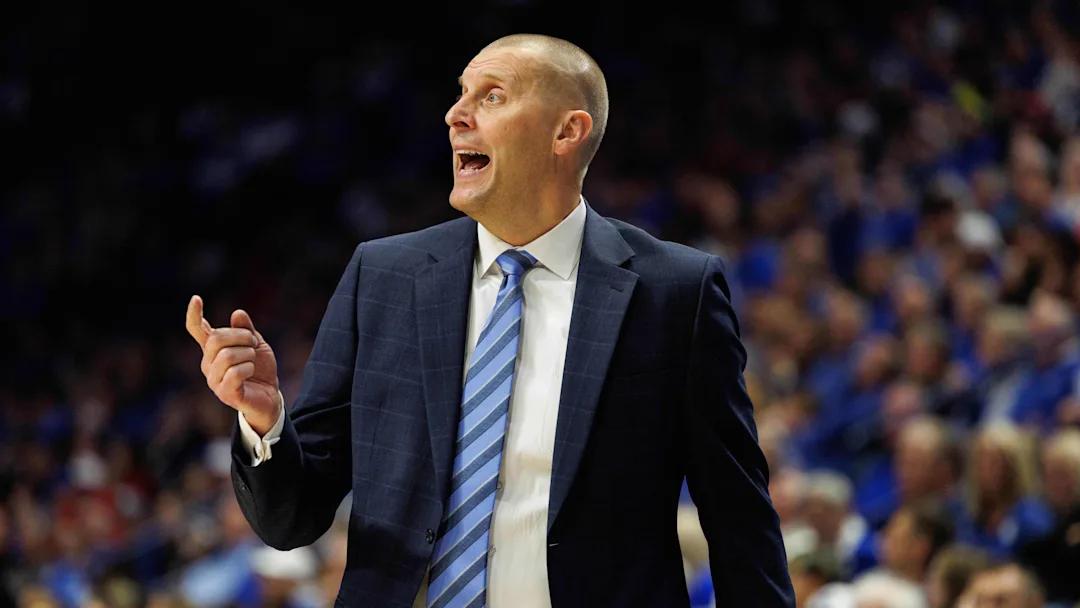Mark Pope Explains How He Is Implementing the Strategies of a Legendary Coach
BYU men’s basketball head coach Mark Pope has been making waves in the collegiate basketball world, not just for his team’s performances but also for his strategic approach to coaching. Known for his energy and innovative mindset, Pope recently revealed how he has been drawing inspiration from the strategies of a legendary coach to elevate his program. While he didn’t shy away from attributing his growth to the influence of basketball icons, he has skillfully adapted these strategies to fit the culture and needs of BYU basketball.
In a candid interview, Pope discussed how studying the methods of legendary coach John Wooden, often referred to as the “Wizard of Westwood,” has transformed his approach to building a winning program. Wooden, who led UCLA to an unprecedented 10 NCAA championships in a 12-year span, remains one of the most revered figures in sports history.
Pope shared that Wooden’s philosophy of focusing on fundamentals, preparation, and team unity has deeply resonated with him. “Coach Wooden wasn’t just about winning games—he was about developing people, teaching life lessons through basketball, and paying attention to the smallest details,” Pope said. “That’s the kind of impact I want to have here at BYU.
Pope has seamlessly incorporated several of Wooden’s legendary principles into his coaching style, while also tailoring them to BYU’s unique environment. Here are some of the ways he is applying these strategies:
- Focus on Fundamentals
One of Wooden’s most famous tenets was an unwavering emphasis on fundamentals. Pope has taken this to heart, dedicating significant time in practice to mastering basic skills like shooting, passing, and footwork. By ensuring his players excel in the basics, Pope is building a strong foundation for success on the court.“The little things matter,” Pope explained. “If you can’t execute the basics under pressure, you can’t win championships. That’s something Coach Wooden believed in, and it’s something I remind my players of every day.”
- Preparation and Practice
Wooden was known for his meticulously planned practices, often down to the minute. Pope has adopted a similar approach, designing highly structured training sessions that maximize efficiency and address specific team needs. Each practice is crafted with clear goals, helping players focus on areas for improvement. - Team Unity and Culture
Wooden’s emphasis on team unity and a positive culture is another key component of Pope’s strategy. At BYU, Pope has fostered an environment where players feel supported both on and off the court. He emphasizes mutual respect, accountability, and a shared vision for success.“It’s not just about X’s and O’s,” Pope said. “It’s about building relationships and creating a family atmosphere. When players trust each other and buy into the system, great things happen.”
- Teaching Life Lessons
Like Wooden, Pope sees basketball as a vehicle for teaching life lessons. He often uses moments during practice and games to instill values like resilience, discipline, and humility in his players.“Basketball is a small part of life,” Pope reflected. “What we’re teaching these young men is how to handle challenges, work hard, and be leaders in whatever they do after basketball.”
While Pope draws heavily from Wooden’s philosophies, he also recognizes the need to adapt to the modern era of college basketball. The rise of the transfer portal, NIL (Name, Image, and Likeness) deals, and evolving playing styles require a flexible and innovative approach.
Pope has blended Wooden’s timeless principles with modern strategies, such as leveraging advanced analytics, integrating technology into training, and creating opportunities for players to benefit from NIL deals while maintaining focus on team goals.
Under Pope’s leadership, BYU basketball has seen remarkable growth. His ability to combine Wooden’s timeless wisdom with his own innovative ideas has made him one of the most respected coaches in the game. The Cougars have not only been competitive in a challenging conference but have also developed a reputation for disciplined play, strong fundamentals, and a cohesive team culture.
Players have expressed their appreciation for Pope’s approach, noting how his emphasis on development extends beyond the court. “Coach Pope pushes us to be better every day—not just as basketball players but as people,” one player remarked. “You can tell he cares about our success in all areas of life.”
As Pope continues to lead BYU, his ability to channel the strategies of legendary coaches like John Wooden will undoubtedly play a key role in the program’s success. By blending tradition with innovation, Pope is building a legacy of his own—one rooted in excellence, integrity, and a commitment to growth.
For BYU fans, the future looks bright under Mark Pope’s guidance. His dedication to applying proven principles while navigating the complexities of modern college basketball ensures that the Cougars will remain a force to be reckoned with for years to come.
